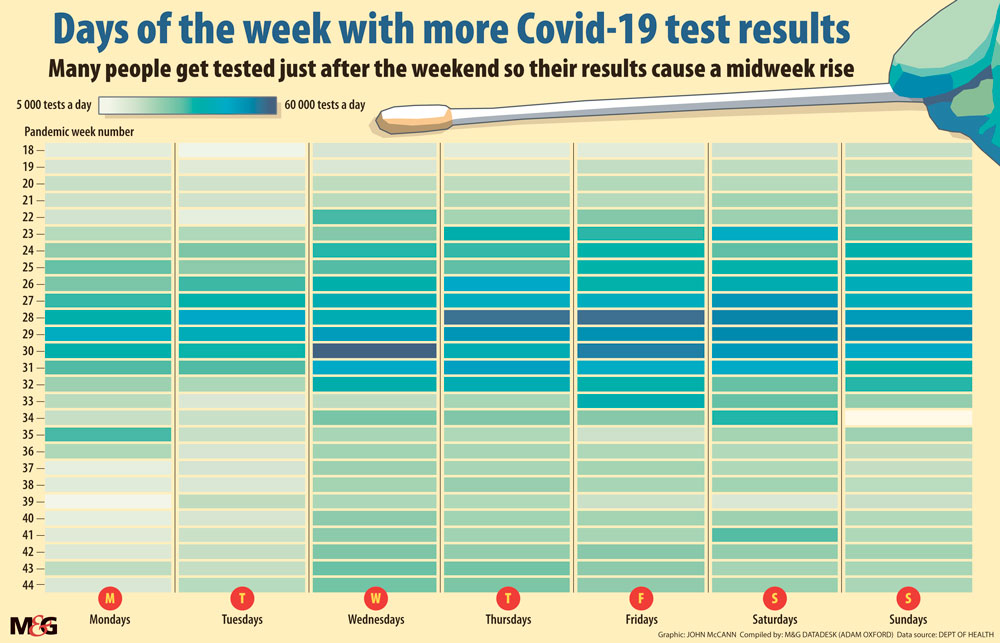A Gauteng health department official collects samples from a man during a door-to-door COVID-19 coronavirus testing drive in Yeoville, Johannesburg, on April 3, 2020. (Marco Longari/AFP)
Fewer South Africans get tested for Covid-19 when weekend festivities, and rest, beckon.
The Mail & Guardian’s analysis of testing data shows that Covid-19 results are more likely to land in the middle of the week than on Mondays. This is because fewer specimens are collected over the weekend and results take two days to be authorised by the National Institute for Communicable Diseases (NICD).
Professor Anne von Gottberg, who is the co-head of the Centre for Respiratory Diseases and Meningitis at the NICD, told the M&G that this is the trend globally. People generally wait until Monday to get tested, she explained.

However, Von Gottberg added, the virus works every day of the week. The risk of infection does not increase or go away just because it is the weekend. “We all need to take preventive measures to limit the spread of the virus,” she said.
Some have called the dip in testing on Saturdays and Sundays the “weekend effect”.
In September, The Spectator analysed testing data from the United Kingdom and found the same trend. The magazine concluded that “testing is not functioning seven days a week, unlike Covid-19”.
As of Sunday, South Africa ranks 13th in the world by case numbers, with 737 278 confirmed cases, 19 801 deaths and almost 5-million tests conducted.
As December approaches and Covid-19 cases surge in other parts of the world, there is more of a focus on how people spend their free time.
Last month, police raided several nightclubs in Johannesburg for flouting regulations set in terms of the Disaster Management Act. Also in October, Cape Town’s southern suburbs reeled from a Covid-19 “superspreader” event when 113 people tested positive for the virus after a jaunt to Tin Roof.
Public health specialist Dr Atiya Mosam said the festive season — and the change in social behaviour that accompanies it — may lead to an uptick of cases. “With December comes more complacency, increased socialising and less social distancing,” Mosam said.
“So while we might not have that same kind of resurgence that other countries are seeing, I do think that if we don’t take the necessary precautions in these upcoming weeks, we are going to start seeing an increase in numbers again.”
Mosam added that it is not the only incumbent on individuals to be vigilant about this threat. “I think a lot of businesses are becoming complacent. Restaurants are not enforcing social distancing. People are really close to each other … There has been a return to a lot of activities that would be cause for concern. So, I think we do need to start looking if regulations are being enforced.”
Mosam said December and early January will be “crunch time” for South Africa to prevent a resurgence of infections. But, right now, it is difficult to say whether the country will experience the same spikes that other countries have seen.
“We have been seeing a decrease if we look at the overall trend in case. But there are still several cases that are being reported daily that I wouldn’t say are negligible. It is still at a level that we need to be taking precautions.”
Professor Glenda Davison, head of the biomedical sciences department at the Cape Peninsula University of Technology, said it is unlikely South Africa will experience the same types of upticks as elsewhere because of how the virus has spread in the country.
“Our pandemic has been slightly different,” Davison said.
“We have different population groups to the UK and Europe. We have poorer communities, which were unable to lock down. So even under lockdown, we saw that the virus still spread among those communities … So we were able to build up our herd immunity.”
Davison added that the danger of a resurgence still exists. “But I don’t think it will reach the peaks that we have seen in Europe and the UK. However, we can’t take that for gospel truth and everybody must obey precautions … Because we’ve already had instances of superspreader events and those are dangerous,” she said.
“So I don’t think we can sit back and relax.”